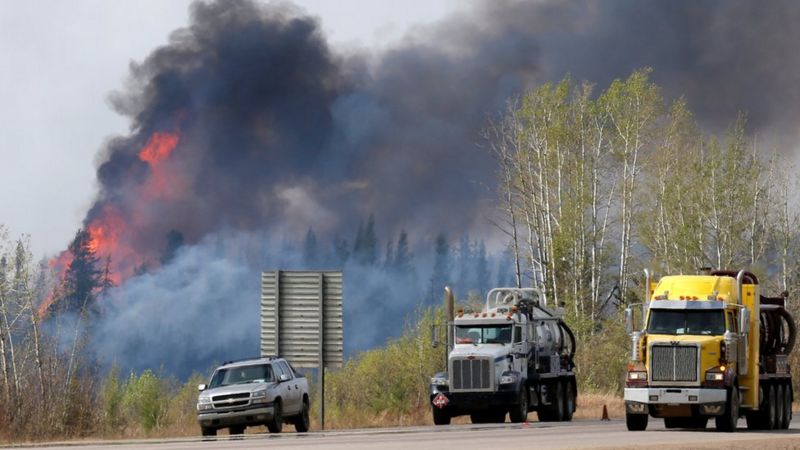Residents of Yellowknife were scrambling to leave the northern Canadian city by air and road ahead of a noon Friday evacuation deadline. There are hours-long queues at the airport and hundreds of passengers have been turned away from packed flights.
The main highway has long traffic queues with officials fearing the road could be cut off as the fire nears. It is one of 240 fires in the Northwest Territories and was about 15km (9 miles) from Yellowknife on Thursday.
The outskirts of the city, home to 20,000 people, could be under threat on Saturday. "I'm really anxious and I'm scared, I'm emotional," Angela Canning told Associated Press after packing her camper van with her important belongings and her two dogs.
"I don't know what I'm coming home to or if I'm coming home. There's just so much unknowns here." The evacuation was ordered on Wednesday because authorities fear the main road in and out of the city could be cut off well before the fire reaches the city.
Reception areas have been set up in Calgary, Alberta, to take evacuees arriving by air or road. Nearly 7,000 people have been forced to evacuate their homes in other parts of the territory and other parts of western Canada are also battling fires in the country's worst season on record.
A state of emergency has been declared in the city of Kelowna in British Columbia, where officials warn the coming days could be the most challenging of the summer. In Yellowknife, a massive queue of people waiting to register for evacuation flights out of the city had formed outside a local high school on Thursday.
Amid light rainfall, police and military personnel moved down the line, handing out snacks, water and chairs. But by afternoon local time, Amy Kennedy, the government's director of communications, said no more than 400 more people could be flown out of Yellowknife.
In a briefing officials said 22 planes were scheduled for Friday and 1,800 people should be able to get on those flights. They said about 5,000 people need to leave Yellowknife by air.
Locals have accused Air Canada and WestJet of inflating prices for flights out of the city as well as change fees for travellers with upcoming flights into Yellowknife. In a statement, an Air Canada spokesman said fares for direct flights had been capped and the airline was currently doubling its regular operations in the city.
But he noted there were "limitations being imposed on flying due to the fires" and that Air Canada had cancelled flights for today (Saturday 19). WestJet said that it had adjusted fares to avoid "price escalation" and was also waiving reschedule fees for people travelling to Yellowknife in the next five days.
Other airlines have also been asked to help people flee the city. Canadian Prime Minister Justin Trudeau said that he had been in contact with the city's mayor to discuss the situation on the ground.
"I reaffirmed our government's commitment to providing support both now and in the days and weeks ahead," he wrote on X, formerly known as Twitter. About 46,000 people live in the Northwest Territories, and Canada's military has been co-ordinating the largest airlift evacuation effort in the region's history.
The communities of Fort Smith, K'atl'odeeche First Nation, Hay River, Enterprise, and Jean Marie River are all also under evacuation orders.
Kakisa, a community of about 40 people some 130km from Hay River, received an evacuation order on Thursday as Canada is having its worst wildfire season on record, with nearly 1,100 active fires burning across the country. Experts have pointed to a warmer and drier spring than normal as the reason.
Scientists say climate change increases the risk of the hot, dry weather that is likely to fuel wildfires.











